Are you looking for the best mouthwash for gum disease, mouth ulcers, bad breath or dry mouth in the UK? Do you want to avoid specific ingredients like fluoride or know which ones dentists recommend?
Perhaps you want to try a homemade mouth rinse or maybe you just want to know how and when to use mouthwash to get the best effects.
Well, whatever your questions, we have the answers in this comprehensive guide to mouthwash. You can read about:
- The best mouthwash in the UK
- Ingredients to look out for and which ones to avoid
- Recipes for natural homemade mouth rinses
- How to use mouthwash correctly (and whether you really need to use it at all)
We hope this information helps you make the right choices for your oral hygiene needs. If you just want a quick answer about the best mouthwash for a certain purpose, the table below has our recommendations. You can read about all these and more in the rest of the article.
Best Mouthwash Options | ||
Best For: Stronger bad breath protection | The Breath Co  | |
Best For: Treating gum disease | Corsodyl Treatment  | |
Best For: Sensitive teeth, enamel protection | Sensodyne Pronamel  | |
Best For: All-round mouthwash for bad breath | Listerine Total Care Zero  | |
Best For: All-round mouthwash for bad breath | Colgate Plax Soft Mint  | |
Best For: Dry mouth | Biotène Dry Mouth Oral Rinse  | |
Best For: Fluoride-free | AloeDent  | |
The best mouthwashes in the UK for…
There are a lot of mouthwash brands in the UK to choose from. Big names like Listerine, Corsodyl, Colgate, and Dentyl dominate the market, but you’ll come across all kinds of other specialist brands, too.
Further down we’ll give some more information on the different brands and what they are best for, but here you can find our recommended mouthwashes to tackle specific problems or requirements.
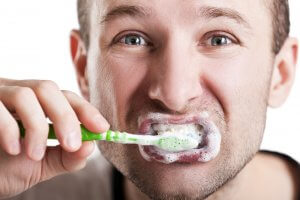
Best mouthwash for bad breath
Probably the most common reason for using mouthwash is to target bad breath. Pretty much all mouth rinses counteract bad breath whether by covering it up with a minty smell or by fighting the bacteria in the mouth that cause bad breath.
Before we talk about the best mouthwash for bad breath in the UK, a word of warning. The best way to get rid of bad breath is by brushing your teeth properly twice a day and cleaning between teeth daily with floss or an interdental brush.
This is the most effective way to remove the plaque bacteria which cause bad breath and tooth decay. Using a tongue scraper can also make a big difference to your breath.
If you are already doing this and you still feel you need to use a bad breath mouthwash regularly, you should probably visit your dentist to check what’s causing your breath to smell.
You might have gum disease, cavities, or some other medical problem that won’t go away just by using mouthwash. Or it may just be that you need to work on your technique and learn how to floss and brush all over again!
Read our full guide on the causes of bad breath and how to stop it if you want to know more.
What to look for in a bad breath mouthwash
An antibacterial mouthwash can help combat bad breath by killing the plaque bacteria which cause bad smells in the mouth. Also look for a mouthwash without alcohol, since this can dry the mouth out and make it smell worse in the long run.
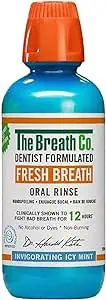
Listerine Total Care Zero and Colgate Plax Soft Mint are two of the big-name brands which meet these criteria, so if you’re looking for an affordable bad-breath mouthwash then these are a good place to start.
The Breath Co makes a range of mouthwashes for bad breath which comes highly rated by people who haven’t had great results with some mainstream brands.
Not only effective on bad breath, this product is also vegan, gluten-free, and free from artificial flavours and colours.
The downside is the price – it’s about three to four times as much as standard brands. Some people report only needing to use it once a day to keep their breath in check though, and if you have had no luck with cheaper mouthwashes for bad breath then this could be worth a try.
If you’re looking for a specialist bad breath mouthwash that contains fluoride, try UltraDEX Daily Oral Rinse. It has 230ppm fluoride and technology which eliminates bad breath compounds for up to 12 hours.
A unique feature of UltraDEX mouthwash is that it comes unflavoured, with an optional sachet of mint flavouring which you can add to the bottle before using it if you wish.
Best mouthwash for gum disease in the UK
Has your dentist recommended mouthwash for better gum health? Or perhaps you’ve spotted the signs of early gum disease – swollen, red, sore, receding or bleeding gums – and want an intensive gum disease mouthwash to help reverse the problem.
The best mouthwash for gum disease is one that contains chlorhexidine gluconate. Chlorhexidine mouthwash kills the plaque bacteria which are responsible for gum inflammation. In addition, it helps to protect teeth and gums from plaque buildup for up to 12 hours.
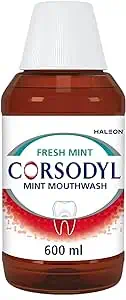
Corsodyl Treatment mouthwash for healthy gums
Corsodyl Treatment mouthwash is trusted and recommended by dentists and hygienists throughout the UK. It contains 2% chlorhexidine digluconate for the short-term treatment of gum disease. It’s not famed for its great taste, but then again its primary purpose is not to freshen breath.
Corsodyl’s antibacterial mouthwash is also available in an alcohol-free version. Both varieties are fluoride-free.
Does Corsodyl mouthwash work? Yes – when used correctly. This Cochrane review demonstrates the effectiveness of chlorhexidine mouthwash at reducing gingivitis and plaque when used for four to six weeks alongside thorough brushing. If you don’t clean your teeth well while using this or any other kind of mouthwash, it won’t be as effective.
There are other chlorhexidine gluconate antiseptic mouthwashes available in the UK, including supermarket own brands which are usually cheaper. As long as they contain this key ingredient at a 0.12% or 0.2% concentration, they should be equally effective at treating gum disease. The main difference is likely to be the taste, which comes down to personal preference.

Corsodyl mouthwash side effects
Do be aware that Corsodyl Treatment mouthwash and other antiseptic mouthwash brands containing chlorhexidine should only be used for short-term treatment of gum disease. You should follow the instructions given on the label of your product or use it as advised by your dentist.
Using these strong mouth rinses for over four weeks can cause teeth staining, especially if you drink a lot of coffee, tea, or red wine. The staining won’t be permanent – it can be cleaned by a hygienist – but it’s worth taking steps to avoid it if possible.
Also, note that gingivitis mouthwash is not a substitute for good oral hygiene. Gum disease will soon return if you don’t maintain good teeth-cleaning habits. If you regularly get gingivitis symptoms, consult your dentist rather than regularly using Corsodyl.
You might need to have a deep dental cleaning and receive some advice on how to take better care of your teeth and maintain healthy gums. Watch the short video below for some more information about gum disease.
Best mouthwash for dry mouth
Dry mouth occurs when you don’t produce enough saliva. This makes it easier for bacteria to build up, causing bad breath. Always use an alcohol-free mouthwash for dry mouth, since alcohol can dry the mouth out further.
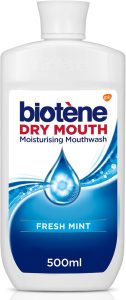
Biotène Dry Mouth Oral Rinse has a special formula that immediately moisturises the mouth for up to four hours. It can be used up to five times a day. Biotène costs more than many standard mouthwashes, but most people find it makes a big difference to their symptoms.
“Keeps my mouth well moisturised and lasts for a good few hours. The taste is pleasant, which helps too.” says one reviewer who suffers from chronic dry mouth.
Biotène is also available as a spray, which is more convenient to use throughout the day.
For a more natural alternative, The Breath Co have a dry mouth variant with natural salivary stimulants.
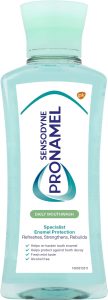
Best mouthwash for sensitive teeth
If you’re looking for mouthwash for sensitive teeth, choose one that’s alcohol-free and contains fluoride, which strengthens tooth enamel. Potassium nitrate, a desensitising ingredient, is also included in many sensitive teeth remedies.
Sensodyne Pronamel Mouthwash is one of the best high fluoride mouthwashes in the UK, at 450ppm – that’s double all the other mouthwashes featured here. It’s designed especially for sensitive teeth and helps protect them from acids we consume every day in things like fruit, fizzy drinks and wine.
The taste of this Sensodyne mouthwash is not overbearing and it’s a good supplement to their sensitive toothpaste range.
Best fluoride-free mouthwash
Choosing a fluoride mouthwash means you get extra tooth enamel protection – one of the main benefits of using a daily mouth rinse. However, for people who prefer a natural mouthwash, there are plenty of fluoride-free mouthwashes available in the UK as well.
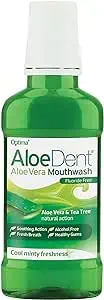
One popular fluoride-free mouthwash is AloeDent. It contains natural ingredients, including soothing aloe vera and antibacterial tea tree oil. It has a distinctive strong taste, which some people love and others aren’t so keen on.
Also worth considering is the range of mouthwashes from The Breath Co, none of which contain fluoride or alcohol.
All the mouthwashes from AloeDent and The Breath Co are vegan/vegetarian too.
Whitening mouthwash
Many brands include a teeth whitening mouthwash in their range, containing hydrogen peroxide or another whitening agent. Hydrogen peroxide is the same ingredient used in professional whitening treatments, but its concentration in whitening mouthwashes is so low its effects are minimal.
You might notice a difference if you use a teeth-whitening mouthwash with hydrogen peroxide every day for several months, but then again you might not.
For this reason, we don’t have a product to recommend as the ‘best whitening mouthwash’. If you want to noticeably whiten your teeth, you can start by switching to whitening toothpaste, or try a more effective whitening method instead.
If it’s been a while since you had a scale and polish with a hygienist, book yourself in for one. You might be surprised at how much brighter your teeth look after a proper clean.
Kids’ mouthwash
Can you use mouthwash for kids? Some brands, including Listerine and Aquafresh, make special children’s mouthwashes with a child-friendly taste and fluoride to protect teeth against cavities. Although not an essential part of a child’s oral hygiene routine, your dentist might recommend using one for extra enamel protection.
Many ‘adult’ daily use mouthwashes are also fine for children aged 6+, provided they don’t contain alcohol, but children shouldn’t use stronger medicated rinses.
Children mustn’t swallow mouthwash, so make sure they are supervised until you’re confident they will spit it out every time.
Best mouthwash brands in the UK
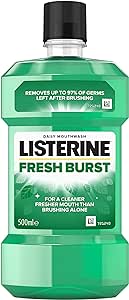
We’ve mentioned some of the best mouthwashes in the UK for specific purposes. Now we’re going to look in more detail at noteworthy brands, their wider product ranges, and the things that set them apart.
Listerine
Listerine mouthwash comes in a rainbow of colours, each variety offering a different benefit. Their basic range offers an affordable way to freshen breath and fight plaque, but it’s Listerine Total Care that we’d recommend as a multi-purpose fluoride mouthwash.
If you’re not a fan of the strong taste of traditional Listerine flavours – which are a blend of four essential oils – then Listerine Total Care Zero could be worth a try. It’s alcohol-free and has a less intense flavour than their other varieties.
Listerine Total Care 10 in 1 | Listerine Total Care 10 in 1 Milder Taste | Listerine Total Care 10 in 1 Sensitive | Listerine Total Care 10 in 1 Teeth and Gum | |
Colour | Purple | Light purple | Light blue | Light green |
Fluoride concentration | 100 ppm | 220 ppm | 100 ppm | 225 ppm |
Other active ingredients | Zinc chloride | Potassium nitrate, no alcohol | Potassium nitrate | |
Benefits | All-round protection | Strong protection, mild taste | Protects against sensitivity | High fluoride to protect enamel |
Cost |
Listerine also produces Smart Rinse children’s mouthwash in berry and mint flavours.
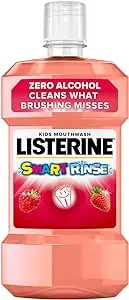
Corsodyl
We’ve already picked out Corsodyl Treatment Mouthwash as one of the best for gum problems, thanks to its antimicrobial formulation containing chlorhexidine. This Corsodyl mouthwash can also be used for oral thrush and mouth ulcer treatment, but is only intended for short-term use.
Their alcohol-free alternative, Corsodyl Daily Mouthwash, also contains fluoride and is available in three mint flavours.
CB12
CB12 mouthwash has a patented formula which contains chlorhexidine, fluoride and zinc. Available in menthol mint, mild mint and whitening variants, the company claims that CB12 mouthwash neutralises odours on the breath for at least 12 hours. Although this claim has been scientifically backed up, not everyone who uses it agrees.
Colgate
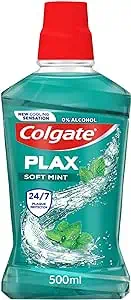
Colgate is a well-known toothcare brand in the UK, with a range of mouthwash varieties on par with Listerine. Here are some with specific benefits:
- Colgate Plax Soft Mint is a daily-use, fluoride mouthwash that’s alcohol-free and has a mild taste.
- Colgate Plax Natural Fresh is a good option for people who don’t like the usual mint flavours. It’s gently flavoured with tea and lemon extracts and it’s alcohol-free.
- Colgate Sensitive Pro-Relief is specially formulated to seal teeth over time and protect against sensitivity.
- Colgate FluoriGard is an alcohol-free rinse with 225ppm fluoride to provide daily cavity protection. It doesn’t have the same harsh taste as some other brands.
- Colgate Peroxyl Mouthwash is a medicated product containing hydrogen peroxide. It’s a good mouthwash for mouth ulcers and mouth sores since it’s designed to relieve minor mouth and gum irritations and prevent infection. Use for 7 days maximum.
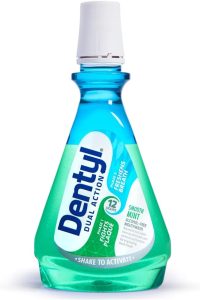
Dentyl
Dentyl mouthwash has a unique dual-action formula, designed to remove more plaque while rinsing. The water/oil mixture is activated by shaking the bottle.
Dentyl comes in three flavours: Smooth Mint, Fresh Clove, and Icy Cherry, so is a good non-mint mouthwash option.
Difflam
Difflam Oral Rinse is a benzydamine mouthwash with anti-inflammatory and anaesthetic properties. It’s used to relieve pain if you have a sore throat or are recovering from a dental procedure.
Does mouthwash work and is it necessary?
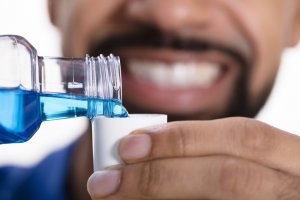
We may as well address these questions first so you know whether it’s worth using mouthwash at all. You might wonder “Is mouthwash good?” or “Is mouthwash bad for you?” but it’s not really that simple. There are many kinds of mouth rinse which contain different ingredients to target different oral health needs.
Benefits of mouthwash
It’s well established that mouthwash is good for freshening breath, and if you choose a fluoride mouthwash then it can help strengthen your teeth, too.
You might be advised to use an antimicrobial mouthwash for gum disease, herpes on the tongue, or a special rinse for dry mouth.
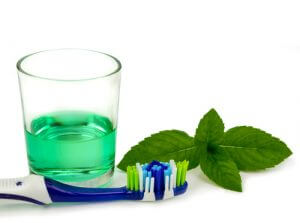
So, a mouth rinse can be a helpful addition to your oral hygiene routine if you have one of these specific needs.
However, using a mouth rinse is not considered necessary by bodies like the NHS and Oral Health Foundation.
They recognise the benefits of fluoride mouthwash, but also offer words of caution which we have included in the list below.
As a patient, how do you know if you need to use mouthwash? Simple answer? Talk to your dentist. A comprehensive dental exam can reveal if you need mouthwash, what kind you need, and how often you should use it.
Mouthwash is a good addition to your oral care routine but does NOT replace the regular use of brushing and flossing. Mouthwash reaches in-between spaces in the mouth that toothbrushes or floss can’t reach.
Always consult with a dentist before you start using mouthwash to determine the kind and frequency. Some mouthwashes have a high alcohol content and can damage your teeth’ enamel if not used appropriately or if used too much.
Dr Kevin Varley, Stonebrook Family Dental
Natural homemade mouthwash
If you like to know exactly what you’re putting in your mouth, you may prefer to make your own natural mouthwash at home. You might also be interested in our natural toothpaste recipes.
Can mouthwash be bad for you?
There are a few drawbacks to using mouthwash that you should know before deciding whether to use it regularly:
- It can make you think your teeth are clean when they are not. Mouthwash is not a substitute for brushing twice a day and cleaning between teeth daily since it doesn’t effectively remove plaque.
- It can wash away the fluoride and other beneficial ingredients in your toothpaste. Wait at least 30 minutes after brushing before rinsing your mouth, otherwise, the fluoride in your toothpaste won’t be as effective.
- Regular use of mouthwash for bad breath may be masking a more serious problem. Halitosis (chronic bad breath) can be caused by rotting teeth, gum disease, and other medical conditions. Visit your dentist rather than trying to cover up the issue.
- Antibacterial mouthwash can disrupt the good as well as the bad bacteria in your mouth. Certain bacteria are an important part of your immune system, and you may experience side effects from wiping them out daily.
- Some people experience a reaction to certain ingredients. If it feels like your mouthwash is burning your tongue or making it sting, stop using it and try a different formula.
Is alcohol-free mouthwash better?
Many types of mouthwash contain ethanol, a type of alcohol, which helps fight the plaque bacteria that cause tooth decay and bad breath. Ethanol also helps other ingredients blend and acts as a preservative.
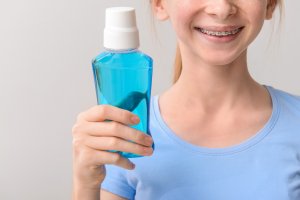
The alcohol content of mouthwash can be quite high, ranging from around 14% to 26% in different brands. Swishing a capful around your mouth won’t get you tipsy, but there are several reasons why you might want to avoid a mouthwash that contains alcohol:
- Children will be using it
- There are older children or recovering alcoholics in the household who might be tempted to deliberately ingest it
- You don’t like the strong taste
- It causes a burning sensation or sensitivity in the mouth
- You find it makes your mouth dry
- You’re worried about the possible links with oral cancer
Fortunately, there are plenty of good alcohol-free mouthwashes available as well. Many use CPC (cetylpyridinium chloride) as an alternative ingredient to fight plaque.
How to use mouthwash
So now you know which is the best mouthwash for your needs, let’s make sure you understand how to use it correctly.

- Check the instructions on the label. With stronger, medicated brands you might need to dilute the solution before use. The packet will also tell you how much to use, and how long for.
- Measure out the correct amount. You can pour it into a glass or the bottle cap (which might have a marker to show the right amount), but don’t tip it straight into your mouth without measuring it.
- Swish vigorously. Keeping your mouth closed, swish the liquid around your mouth and between your teeth. You might choose to gargle, too. Keep going for the specified time, usually 30 or 60 seconds.
- Spit. Don’t swallow any mouth rinse, since the ingredients can be harmful if ingested in large enough quantities.
- If using a fluoride mouthwash, don’t eat or drink for 30 minutes after use. This lets the fluoride have maximum effect protecting against dental decay.
When to use mouthwash
Unsure whether to use mouthwash before or after brushing? Unless specifically directed by your dentist, the answer is neither. That is to say, you won’t get much benefit from using mouthwash before you brush, and if you use it straight after brushing, it will wash away the beneficial ingredients in your fluoride toothpaste.
Even if you use a fluoride mouthwash, the concentration is much lower than most toothpastes for adults – around 100-250 ppm compared to 1,350 – 1,500 ppm.
So, when should you use mouthwash? Wait at least half an hour after brushing if you want an extra burst of freshness, or instead use it at another time when you don’t brush, for example after lunch.
Mouthwash may seem like an everyday product that’s safe for anyone to use, but there are some circumstances in which it is not recommended:
- For people who are allergic to any of the mouthwash ingredients
- For children under six years of age, due to risk of swallowing
- Iodine-containing mouthwash should be avoided by people with hyperthyroidism or other thyroid diseases, due to possible systemic absorption of iodine.
–Renad Nahhas, Pharmacist
FAQs
What happens if you swallow mouthwash?
If you have accidentally swallowed mouthwash while rinsing your mouth, don’t panic. Although it’s not meant to be swallowed, ingesting such a small amount is unlikely to cause any side effects.
How often should you use mouthwash?
Check the label or follow your dentist’s instructions. Many mouth rinses are safe for daily use over a prolonged period of time. However, some stronger rinses are only intended for short-term use.

Does mouthwash stain teeth?
Stronger formulations containing chlorhexidine, like Corsodyl Treatment Mouthwash, have the potential to cause temporary teeth staining when used over a prolonged period (four weeks or more).
How much alcohol is in mouthwash?
The alcohol content of mouthwash brands in the UK ranges from around 14% to 26%. Using it as instructed and spitting it out won’t have any adverse effects, but there is the potential for abuse.
Why does mouthwash burn or sting my mouth?
If you’re left with a burning or stinging feeling in your mouth after using mouthwash, you’re probably sensitive to one of the ingredients. Alcohol is the most likely culprit.
Which mouthwash is most effective?
It depends on your needs; if you have sensitive teeth, choose one that’s alcohol-free and contains fluoride. If you have a dry mouth, use an alcohol-free mouthwash.
NHS: How to keep your teeth clean. Consulted 4th March 2023.
Oral Health Foundation: Caring for my teeth and gums. Consulted 4th March 2023.
Registered Dental Hygienist: Do you want that mouthwash straight up or on the rocks? Consulted 3th March 2023.
Cochrane Library: Chlorhexidine mouthrinse as an adjunctive treatment for gingival health. Consulted 2th March 2023.
NCBI. Topical Hyaluronic Acid in the Management of Oral Ulcers. Consulted 2th March 2023.
NCBI. Hyaluronic Acid: A Boon in Periodontal Therapy. Consulted 4th March 2023.




